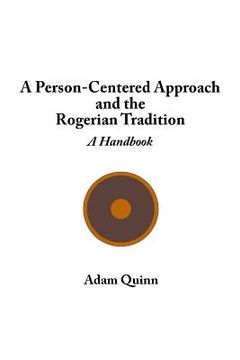Share
A Person-Centered Approach and the Rogerian Tradition: A Handbook (in English)
Adam Quinn
(Author)
·
Createspace Independent Publishing Platform
· Paperback
A Person-Centered Approach and the Rogerian Tradition: A Handbook (in English) - Quinn, Adam
$ 10.39
$ 12.99
You save: $ 2.60
Choose the list to add your product or create one New List
✓ Product added successfully to the Wishlist.
Go to My WishlistsIt will be shipped from our warehouse between
Monday, July 08 and
Tuesday, July 09.
You will receive it anywhere in United States between 1 and 3 business days after shipment.
Synopsis "A Person-Centered Approach and the Rogerian Tradition: A Handbook (in English)"
From the Book: "it is hypothesized that the therapist wants to understand for no other reason but to understand. If the therapist is motivated to understand solely to be a change agent for the client, then the facilitative mechanisms may not be sufficient because a tendency toward unconditional acceptance will not effectively emerge.""the published literature in the 1970s suggests that person-centered therapy (PCT) researchers, rather than pursuing novel avenues of empirical inquiry, devoted substantial time in defending PCT against - what now appear to be - unfounded claims made by a group of social scientists who held significant professional interest in seeing through the dismantling of the person-centered approach."Book Summary: This book is about a person-centered approach to counseling and psychotherapy as developed by the psychologist Carl Rogers (1902-1987) and his colleagues. In addition, this book is also intended to be a handbook on the person-centered approach and the Rogerian tradition for use in academic and non-academic settings alike. Each chapter is briefly summarized below.Chapter 1 ("A Person-Centered Approach and the Structure of Scientific Revolutions") examines the trend of scientific inquiry in psychotherapy research, specifically focusing on events and changes that took place beginning in the 1970s and are argued to have substantially influenced the direction of psychotherapy research in the following decades. In particular, these changes are suggested to have been guided by the choices made by a small but influential group of behavior and psychoanalytic-oriented researchers, which arguably led to changes in the scientific methods used to investigate the effectiveness of psychotherapeutic treatments; and, as will be shown in this chapter, led to the decline and disappearance of Carl Rogers's person-centered approach. This chapter suggests that through a method of allegiance-guided scientific inquiry, the Rogerian tradition was systematically dismantled by a group of social scientists that held considerable professional interests to do so.Chapter 2 ("A Person-Centered Approach to Multicultural Counseling Competence") examines current and historical trends in psychotherapy research and practice with racial/ethnic minority populations. Using psychotherapy evidence from both the latter half of the 20th century and the initial decades of the 21st century, cultural adaptations to previously hypothesized person-centered therapy mechanisms of change are proposed.Chapter 3 ("A Person-Centered Approach to the Treatment of Borderline Personality Disorder") addresses psychotherapy with a person described as possessing a borderline personality disorder (BPD). In particular, a selection of mainstream approaches is reviewed to examine unique and universal aspects of current thinking about this treatment population. Following this review, an expanded analysis of person-centered therapy is offered, examining current research evidence and the mechanisms of change hypothesized to occur in the person-centered treatment of BPD.Chapter 4 ("A Person-Centered Approach to the Treatment of Combat Veterans with Posttraumatic Stress Disorder") examines posttraumatic stress disorder through the lens of military combat trauma that results in a breakdown of a combat veteran's sense of self and the world. In the effective treatment of combat-related posttraumatic stress disorder, a therapist must help the veteran reorganize the self-structure that has become incongruent with his or her precombat-trauma self following his or her return home from war. For the therapist to facilitate a veteran's becoming whole, he or she must be genuinely congruent in the relationship.
- 0% (0)
- 0% (0)
- 0% (0)
- 0% (0)
- 0% (0)
All books in our catalog are Original.
The book is written in English.
The binding of this edition is Paperback.
✓ Producto agregado correctamente al carro, Ir a Pagar.

